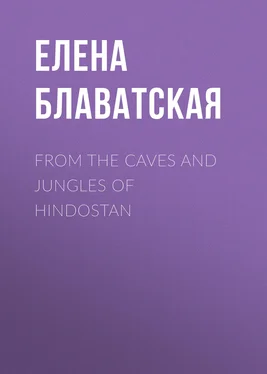Елена Блаватская - From the Caves and Jungles of Hindostan
Здесь есть возможность читать онлайн «Елена Блаватская - From the Caves and Jungles of Hindostan» — ознакомительный отрывок электронной книги совершенно бесплатно, а после прочтения отрывка купить полную версию. В некоторых случаях можно слушать аудио, скачать через торрент в формате fb2 и присутствует краткое содержание. Жанр: Путешествия и география, История, foreign_edu, foreign_antique, foreign_prose, на английском языке. Описание произведения, (предисловие) а так же отзывы посетителей доступны на портале библиотеки ЛибКат.
- Название:From the Caves and Jungles of Hindostan
- Автор:
- Жанр:
- Год:неизвестен
- ISBN:нет данных
- Рейтинг книги:5 / 5. Голосов: 1
-
Избранное:Добавить в избранное
- Отзывы:
-
Ваша оценка:
- 100
- 1
- 2
- 3
- 4
- 5
From the Caves and Jungles of Hindostan: краткое содержание, описание и аннотация
Предлагаем к чтению аннотацию, описание, краткое содержание или предисловие (зависит от того, что написал сам автор книги «From the Caves and Jungles of Hindostan»). Если вы не нашли необходимую информацию о книге — напишите в комментариях, мы постараемся отыскать её.
From the Caves and Jungles of Hindostan — читать онлайн ознакомительный отрывок
Ниже представлен текст книги, разбитый по страницам. Система сохранения места последней прочитанной страницы, позволяет с удобством читать онлайн бесплатно книгу «From the Caves and Jungles of Hindostan», без необходимости каждый раз заново искать на чём Вы остановились. Поставьте закладку, и сможете в любой момент перейти на страницу, на которой закончили чтение.
Интервал:
Закладка:
On The Way To Karli
It is an early morning near the end of March. A light breeze caresses with its velvety hand the sleepy faces of the pilgrims; and the intoxicating perfume of tuberoses mingles with the pungent odors of the bazaar. Crowds of barefooted Brahman women, stately and well-formed, direct their steps, like the biblical Rachel, to the well, with brass water pots bright as gold upon their heads. On our way lie numerous sacred tanks, filled with stagnant water, in which Hindus of both sexes perform their prescribed morning ablutions. Under the hedge of a garden somebody's tame mongoose is devouring the head of a cobra. The headless body of the snake convulsively, but harmlessly, beats against the thin flanks of the little animal, which regards these vain efforts with an evident delight. Side by side with this group of animals is a human figure; a naked mali (gardener), offering betel and salt to a monstrous stone idol of Shiva, with the view of pacifying the wrath of the "Destroyer," excited by the death of the cobra, which is one of his favourite servants. A few steps before reaching the railway station, we meet a modest Catholic procession, consisting of a few newly converted pariahs and some of the native Portuguese. Under a baldachin is a litter, on which swings to and fro a dusky Madonna dressed after the fashion of the native goddesses, with a ring in her nose. In her arms she carries the holy Babe, clad in yellow pyjamas and a red Brah-manical turban. "Hari, hari, devaki!" ("Glory to the holy Virgin!") exclaim the converts, unconscious of any difference between the Devaki, mother of Krishna, and the Catholic Madonna. All they know is that, excluded from the temples by the Brahmans on account of their not belonging to any of the Hindu castes, they are admitted sometimes into the Christian pagodas, thanks to the "padris," a name adopted from the Portuguese padre, and applied indiscriminately to the missionaries of every European sect.
At last, our gharis—native two-wheeled vehicles drawn by a pair of strong bullocks—arrived at the station. English employes open wide their eyes at the sight of white-faced people travelling about the town in gilded Hindu chariots. But we are true Americans, and we have come hither to study, not Europe, but India and her products on the spot.
If the tourist casts a glance on the shore opposite to the port of Bombay, he will see a dark blue mass rising like a wall between himself and the horizon. This is Parbul, a flat-topped mountain 2,250 feet high. Its right slope leans on two sharp rocks covered with woods. The highest of them, Mataran, is the object of our trip. From Bombay to Narel, a station situated at the foot of this mountain, we are to travel four hours by railway, though, as the crow flies, the distance is not more than twelve miles. The railroad wanders round the foot of the most charming little hills, skirts hundreds of pretty lakes, and pierces with more than twenty tunnels the very heart of the rocky ghats.
We were accompanied by three Hindu friends. Two of them once belonged to a high caste, but were excommunicated from their pagoda for association and friendship with us, unworthy foreigners. At the station our party was joined by two more natives, with whom we had been in correspondence for many a year. All were members of our Society, reformers of the Young India school, enemies of Brahmans, castes, aid prejudices, and were to be our fellow-travelers and visit with us the annual fair at the temple festivities of Karli, stopping on the way at Mataran and Khanduli. One was a Brahman from Poona, the second a moodeliar (landowner) from Madras, the third a Singalese from Kegalla, the fourth a Bengali Zemindar, and the fifth a gigantic Rajput, whom we had known for a long time by the name of Gulab-Lal-Sing, and had called simply Gulab-Sing. I shall dwell upon his personality more than on any of the others, because the most wonderful and diverse stories were in circulation about this strange man. It was asserted that he belonged to the sect of Raj-Yogis, and was an initiate of the mysteries of magic, alchemy, and various other occult sciences of India. He was rich and independent, and rumour did not dare to suspect him of deception, the more so because, though quite full of these sciences, he never uttered a word about them in public, and carefully concealed his knowledge from all except a few friends.
He was an independent Takur from Rajistan, a province the name of which means the land of kings. Takurs are, almost without exception, descended from the Surya (sun), and are accordingly called Suryavansa. They are prouder than any other nation in the world. They have a proverb, "The dirt of the earth cannot stick to the rays of the sun." They do not despise any sect, except the Brahmans, and honor only the bards who sing their military achievements. Of the latter Colonel Tod writes somewhat as follows, 1 1 In nearly every instance the passages quoted from various authorities have been retranslated from the Russian. As the time and labor needful for verification would he too great, the sense only of these passages is given here. They do not pretend to be textual.—Translator
"The magnificence and luxury of the Rajput courts in the early periods of history were truly wonderful, even when due allowance is made for the poetical license of the bards. From the earliest times Northern India was a wealthy country, and it was precisely here that was situated the richest satrapy of Darius. At all events, this country abounded in those most striking events which furnish history with her richest materials. In Rajistan every small kingdom had its Thermopylae, and every little town has produced its Leonidas. But the veil of the centuries hides from posterity events that the pen of the historian might have bequeathed to the everlasting admiration of the nations. Somnath might have appeared as a rival of Delphi, the treasures of Hind might outweigh the riches of the King of Lydia, while compared with the army of the brothers Pandu, that of Xerxes would seem an inconsiderable handful of men, worthy only to rank in the second place."
England did not disarm the Rajputs, as she did the rest of the Indian nations, so Gulab-Sing came accompanied by vassals and shield-bearers.
Possessing an inexhaustible knowledge of legends, and being evidently well acquainted with the antiquities of his country, Gulab-Sing proved to be the most interesting of our companions.
"There, against the blue sky," said Gulab-Lal-Sing, "you behold the majestic Bhao Mallin. That deserted spot was once the abode of a holy hermit; now it is visited yearly by crowds of pilgrims. According to popular belief the most wonderful things happen there—miracles. At the top of the mountain, two thousand feet above the level of the sea, is the platform of a fortress. Behind it rises another rock two hundred and seventy feet in height, and at the very summit of this peak are to be found the ruins of a still more ancient fortress, which for seventy-five years served as a shelter for this hermit. Whence he obtained his food will for ever remain a mystery. Some think he ate the roots of wild plants, but upon this barren rock there is no vegetation. The only mode of ascent of this perpendicular mountain consists of a rope, and holes, just big enough to receive the toes of a man, cut out of the living rock. One would think such a pathway accessible only to acrobats and monkeys. Surely fanaticism must provide wings for the Hindus, for no accident has ever happened to any of them. Unfortunately, about forty years ago, a party of Englishmen conceived the unhappy thought of exploring the ruins, but a strong gust of wind arose and carried them over the precipice. After this, General Dickinson gave orders for the destruction of all means of communication with the upper fortress, and the lower one, once the cause of so many losses and so much bloodshed, is now entirely deserted, and serves only as a shelter for eagles and tigers."
Читать дальшеИнтервал:
Закладка:
Похожие книги на «From the Caves and Jungles of Hindostan»
Представляем Вашему вниманию похожие книги на «From the Caves and Jungles of Hindostan» списком для выбора. Мы отобрали схожую по названию и смыслу литературу в надежде предоставить читателям больше вариантов отыскать новые, интересные, ещё непрочитанные произведения.
Обсуждение, отзывы о книге «From the Caves and Jungles of Hindostan» и просто собственные мнения читателей. Оставьте ваши комментарии, напишите, что Вы думаете о произведении, его смысле или главных героях. Укажите что конкретно понравилось, а что нет, и почему Вы так считаете.












